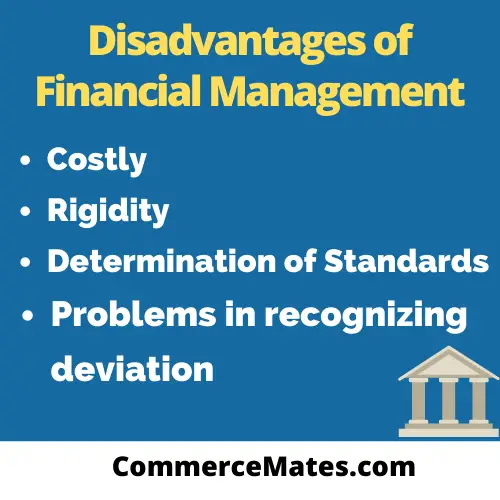Contents
Meaning of Financial Management
Financial Management means applying management principles to manage financial resources of an organisation. It simply involves planning, organising, directing and controlling financial operations to manage finance of an organisation efficiently.
Financial management ensures that an adequate amount of funds is always available in business from different sources and also it earns the best return on its investments. It aims at the achievement of two main objectives for an organization that is profit maximization and wealth maximization.
Fundamentals of Financial Management notes
Profit Maximisation and Wealth Maximisation
Financial management aims at the achievement of profit maximization and wealth maximization for an organization. These are two main objectives on which financial management focuses through better application of funds. Profit maximization is meant to be achieved in the short-run whereas wealth maximization is meant to be achieved in the long run. It aims at increasing the net worth of shareholders by raising their per-unit profit through proper management of their funds.
Proper Utilisation of Resources
The efficient utilization of resources is another important role played by financial management. It aims at maintaining a balance between risk and return by properly monitoring and controlling business operations. Financial management works on reducing the expenses and risks involved in undergoing business activities.
Maintaining Adequate Cash Flow
Maintaining a sufficient amount of funds is necessary for every business organization. It ensures flexibility in their operations and avoids any interruption. A proper amount of cash is always required for meeting various day to day expenses such as payment of raw materials, payment of electricity bills, rent, and employee’s wages or salaries. The finance manager take various decisions for the proper management of cash for maintaining healthy cash flow every time within the organisation.
Long Term Survival of Business
Financial management works toward long term survival of the business. It properly manages all financial affairs of business to retain its profitability for the long term. Today the market is very competitive which makes it difficult for every business to survive in the market. The finance manager takes all decisions in accordance with situations of the market to avoid any unfavorable conditions. They also maintain certain reserves out of business profit for meeting contingencies thereby ensuring the long term continuation of the business.
Estimating Financial Requirements
It is one of the crucial roles played by financial management. The finance manager estimates the adequate amount of funds required by the business for its functioning. He finds out both working capital as well as fixed capital required by the business for attaining its goals. Proper estimation of fund requirements helps in avoiding any shortage or surplus like situations.
Finance manager considers various factors for estimation like scale of operations, type of technology used, number of employees, organisational goals, legal requirements etc. Right estimation helps in efficient procurement and utilisation of required funds.
Reducing Cost of Capital
Every business requires additional funds from time to time. Financial management aims at reducing the cost of capital for business. It acquired funds required by the business at an economical cost. The finance manager properly analyzes the different sources of funds available to them such as shares, debentures, loans, public deposits, etc. They select the one which is available at cheap rates requiring lower interest payments. Financial management designs such capital structure which will lower the cost of capital.
Preparing Capital Structure
Financial management prepares the optimum capital structure for the business. It decides the proper proportion between owned and borrowed funds. Designing the capital mix that is the ratio of debt and equity in the capital of a firm is one of the key decisions of financial management. The issue of more equity will result in more sharing of profit thereby reducing the business share. Whereas the issue of more debt will increase the burden of business as it is required to pay more amount of fixed interest. The right capital structure is essential for liquidity, flexibility, stability, and economy.







